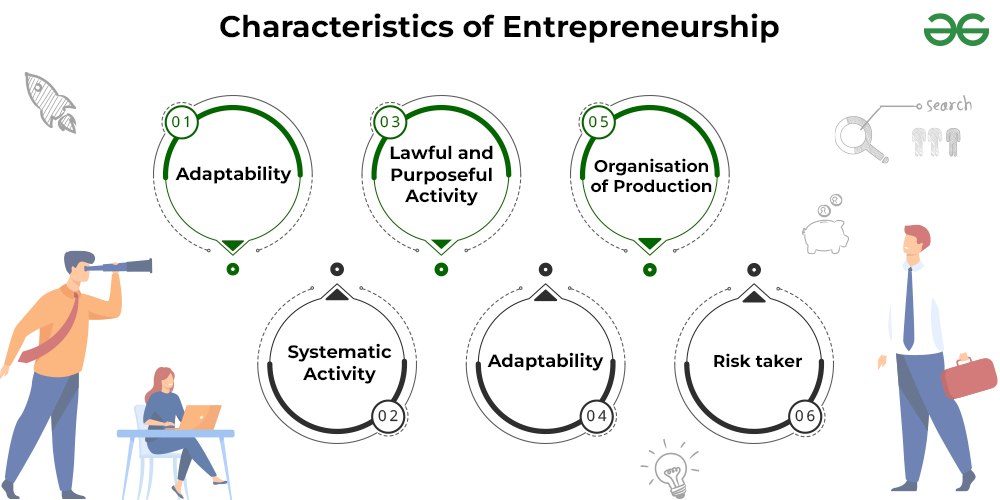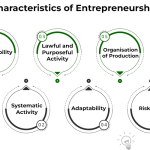Entrepreneurialism has become a vital force reshaping the dynamics of modern work and economy. As more individuals opt for entrepreneurship, the landscape is witnessing the rise of diverse roles like freelancers, managers, and creative professionals who embody this innovative spirit. This shift towards entrepreneurship represents not just a career choice, but a philosophy that promotes personal fulfillment and job creation through self-management and business acumen. With its roots deeply embedded in the American psyche, entrepreneurialism encourages individuals to harness their unique skills and ambitions, fundamentally altering how we engage with work today. In this era, the fusion of entrepreneurship and the self-help movement emphasizes the importance of self-initiative, ultimately leading to more satisfaction and a renewed sense of purpose in our professional lives.
The concept of entrepreneurialism, often referred to as the spirit of enterprise, embodies a dynamic approach to self-employment and business creation that resonates deeply with today’s workforce. This trend includes various forms of entrepreneurial activity, such as freelance work and innovative business management practices that encourage individuals to take charge of their careers. In essence, the pursuit of entrepreneurship has evolved into a broader cultural movement, highlighting the importance of self-directed initiatives and economic adaptability. As this movement gains momentum, it intertwines with themes of personal growth and development, fostering a sense of empowerment that inspires job creation and enhances economic stability. The evolving narrative around this enterprising mindset not only reflects a shift in professional aspirations but also heralds a new era of business innovation and success.
The Rise of Entrepreneurialism in Modern America
In recent years, we’ve witnessed a remarkable rise in entrepreneurialism, changing not just the job landscape but also the very essence of how people view work. More than just business founders, today’s entrepreneurs encompass a broad range of individuals, from freelance workers to ride-share drivers, all embodying the spirit of entrepreneurialism. This shift marks a significant evolution from traditional employment models, prompting many to take fate into their own hands, sparking innovation and job creation in diverse sectors.
Erik Baker’s exploration in “Make Your Own Job” reveals the deep roots of this trend in America, tracing it back to economic changes that forced individuals to seek alternative livelihoods. As technological advancements led to job losses, the entrepreneurial spirit emerged as a response to structural unemployment. As individuals faced the stark reality of diminishing traditional roles, they turned to self-creation in business management, setting the foundation for a new era centered around self-help and empowerment.
Freelance Work: The New Frontier of Employment
Freelance work epitomizes the modern entrepreneurial landscape, offering tremendous flexibility and independence to workers. Unlike traditional roles tied to corporate structures, freelancers operate as independent entities, allowing them to navigate their own paths and embrace the entrepreneurialism that defines the current job market. As companies turn towards outsourcing to adapt to a rapidly changing economy, the freelance workforce is seen as an invaluable asset, providing specialized skills without the overhead costs associated with traditional hiring.
However, with this flexibility comes challenges. Freelance workers must constantly market their skills and manage the uncertainty associated with inconsistent income. The pressure to continuously seek new job opportunities can be overwhelming, turning what should be an empowering choice into a source of stress. Baker’s observations highlight the dual-edged sword of freelance work: it offers autonomy and creativity while simultaneously demanding relentless effort and positioning freelancers in a perpetual state of risk.
Entrepreneurial Mindset: Skills for Success in Business Management and Beyond
An entrepreneurial mindset is no longer confined to business owners; it has permeated through various sectors as essential skills for success. Individuals in business management and other professions are encouraged to adopt this mindset, which emphasizes innovation, problem-solving, and adaptability. As we see organizations strive for agility in an unpredictable economy, fostering an entrepreneurial spirit among workers becomes crucial. Companies are increasingly recognizing the value of empowering their employees to think like entrepreneurs, cultivating an environment where creative solutions can flourish.
Moreover, self-help literature has greatly contributed to the proliferation of the entrepreneurial mindset. Influential writers emphasize the importance of harnessing one’s unique capabilities and creativity to generate value. As Baker illustrates, the persistence of this narrative from the Great Depression to today’s gig economy showcases how the quest for personal fulfillment and economic independence is interwoven with a broader cultural ethos that champions entrepreneurialism.
The Transformative Power of Self-Help in Entrepreneurship
Self-help concepts have long played a vital role in empowering individuals to harness their entrepreneurial instincts. Authors like Napoleon Hill and Abraham Maslow have inspired millions to rethink their approach to work, turning everyday jobs into platforms for personal expression and creativity. In essence, self-help literature offers strategies not only for professional advancement but also for fostering an inner belief that capabilities can lead to significant job creations and transformative outcomes.
In “Make Your Own Job,” Baker effectively illustrates how this genre has reshaped perceptions of work, encouraging individuals to embrace risks and cultivate their unique skills. As people integrate these self-help philosophies, the path to entrepreneurial endeavors often appears less daunting. With guidance from these texts, aspiring entrepreneurs can develop the resilience and adaptability necessary to navigate the complexities of modern business landscapes.
Navigating the Challenges of Entrepreneurialism
While the allure of entrepreneurialism is compelling, it comes with its own set of challenges that individuals must face. The contemporary employee often grapples with balancing individual ambitions and the pressures of the economic climate, leading to stress and feelings of uncertainty. As outlined in Baker’s analysis, the mental burden of entrepreneurialism can lead individuals to a sense of fatigue; after all, constantly striving for success and fear of failure can tarnish the joy of their ventures.
In addition, aspiring entrepreneurs must develop their business management skills to remain competitive. The constantly evolving business landscape requires a commitment to ongoing learning and adaptability. Baker emphasizes that it’s essential not only to identify unique market opportunities but also to continually reassess personal goals within this ever-shifting environment, which can be an exhausting endeavor for many.
The Future of Work: A Sustainable Vision of Entrepreneurialism
As we advance further into the 21st century, the future of work appears to be increasingly aligned with the principles of entrepreneurialism. Individuals are opting for more sustainable career choices—ones that not only fulfill personal aspirations but also have a positive societal impact. This shift cannot be overlooked as we consider how economic development will evolve, with an emphasis on fostering innovation, job creation, and community engagement.
The role of education is paramount in shaping a workforce equipped to thrive within this new paradigm. Encouraging entrepreneurial thinking through educational programs can cultivate a generation of problem-solvers who are ready to tackle the challenges of tomorrow. Baker’s work underscores the importance of nurturing this entrepreneurial ecosystem, where individuals feel empowered to not only innovate but also inspire others along the way.
Embracing Fear and Uncertainty in the Entrepreneurial Journey
Baker’s examination of entrepreneurialism reveals an underlying theme: the intertwining of fear and hope in the entrepreneurial journey. Many aspiring entrepreneurs grapple with the fear of failure, which can be paralyzing. However, embracing this fear and transforming it into a driving force for personal and professional growth is critical. The reality is that risks are an inherent part of the entrepreneurial landscape, and learning to navigate them can yield profound insights.
The process of confronting uncertainty often leads to innovation and creativity. By reframing failure as an opportunity for learning, individuals can cultivate resilience and a mindset primed for growth. This transformation is essential not only for personal fulfillment but also for fostering a culture of entrepreneurship that embraces risk-taking as a catalyst for job creation and economic progress.
The Intersection of Technology and Entrepreneurship
In today’s digital age, the intersection of technology and entrepreneurship cannot be ignored. The rise of social media, e-commerce platforms, and digital marketing has democratized the entrepreneurial landscape, allowing individuals to launch businesses from their homes with relatively low startup costs. As outlined in Baker’s exploration, technology has empowered many to redefine their work environments and create unique opportunities that were previously unimaginable.
However, this powerful dynamic also presents challenges, such as the need for continual adaptation to rapidly changing technologies. Entrepreneurs must not only be skilled in their trade but also savvy in leveraging digital tools to market their products effectively. Navigating this complexity requires a thoughtful approach to business management that integrates technology as a core strategy, ultimately leading to sustainable success.
Rethinking Job Creation Through an Entrepreneurial Lens
Job creation is traditionally viewed through the lens of companies expanding their workforce. Yet, as Baker suggests, we need to reconsider how we frame job creation in the context of entrepreneurialism. With the proliferation of startups and freelance work, individuals are increasingly taking on roles that contribute to the economy without necessarily fitting into a traditional employment model. This shift has profound implications for how we understand workforce development.
By embracing entrepreneurial thinking, communities can foster environments that encourage innovation and support the creation of new businesses. This requires collaboration among educators, policymakers, and industry leaders to create pathways for aspiring entrepreneurs. As Baker articulates, rethinking job creation through the lens of entrepreneurialism may lead to sustainable economic growth that benefits not only individuals but society as a whole.
Conclusion: The Evolution of Work and Entrepreneurial Spirit
The evolution of work in America reflects a profound shift toward entrepreneurialism, characterized by innovation, risk-taking, and the desire for meaningful engagement. As Baker highlights, today’s workforce is more diverse than ever, comprised of varied individuals navigating their journeys in this entrepreneurial landscape. Understanding this new paradigm is crucial for those seeking fulfillment in their careers while simultaneously tackling modern economic realities.
Ultimately, the embrace of entrepreneurialism signals a significant transformation in how we perceive work and its potential to impact our lives. Moving forward, it is essential to continue nurturing this spirit, fostering resilience and adaptability among individuals, and promoting self-help narratives that inspire creativity and ambition. Regardless of the challenges, the promise of entrepreneurship remains a beacon for many, offering a pathway to fulfillment and growth in an ever-evolving economy.
Frequently Asked Questions
What is entrepreneurialism, and how does it relate to modern work environments?
Entrepreneurialism refers to the approach of individuals who embrace the principles of entrepreneurship within various work environments. It encompasses not just founders of companies, but also managers and freelancers who apply innovative thinking and personal ambition. In today’s work environments, entrepreneurialism reshapes how individuals engage with their roles, emphasizing creativity and ownership over traditional job duties.
How can freelance work be a pathway to entrepreneurialism?
Freelance work exemplifies entrepreneurialism as it allows individuals to leverage their unique skills to build their own businesses. Freelancers operate independently, making decisions about their projects, pricing, and client relationships. This independence fosters the entrepreneurial spirit, enabling professionals to innovate and adapt to market demands, which is essential in a constantly evolving economy.
What role does business management play in fostering entrepreneurialism?
Business management is crucial for fostering entrepreneurialism as it equips leaders with the skills to inspire and motivate teams. Modern management approaches prioritize entrepreneurial management, focusing on collaboration and empowerment rather than strict oversight. Effective business management encourages employees at all levels to adopt entrepreneurial behaviors, driving innovation and job satisfaction.
How does self-help literature influence the entrepreneurial mindset?
Self-help literature significantly influences the entrepreneurial mindset by promoting personal growth and the value of individual initiative. Books like Napoleon Hill’s ‘Think and Grow Rich’ encourage readers to harness their unique talents and knowledge to create opportunities. This genre of literature reinforces the belief that anyone can become an entrepreneur by cultivating the right mindset and skills, which is foundational to successful entrepreneurship.
What impact does entrepreneurialism have on job creation?
Entrepreneurialism has a profound impact on job creation as it encourages individuals to establish new businesses and innovative solutions. Entrepreneurs identify gaps in the market and respond with unique offerings, thus generating new employment opportunities. This spirit of job creation not only drives economic growth but also contributes to a dynamic workforce capable of adapting to changing industry landscapes.
| Key Points |
|---|
| Rise of Entrepreneurialism: The shift from traditional jobs to entrepreneurial roles has become prevalent in recent years, with individuals from various fields embracing entrepreneurship. |
| Historical Context: Baker traces the enthusiasm for entrepreneurialism back to the late 19th century when job losses spurred a cultural shift towards self-employment. |
| Cultural Shift: A change in mindset occurred, focusing on personal skills and ambition rather than just hard work, highlighting the influence of self-help literature over the decades. |
| Entrepreneurial Management: The evolution from traditional management to ‘entrepreneurial management’ emphasized inspiration and collaboration among employees instead of mere production. |
| Impact of Economic Stress: Economic challenges often led to an increase in entrepreneurial activity, with individuals finding new opportunities in freelance and small businesses. |
| Modern Implications: Currently, fears of job displacement have further encouraged individuals to adopt an entrepreneurial mindset, constantly preparing for the future while managing present anxieties. |
Summary
Entrepreneurialism has become a defining characteristic of modern work culture, with a growing number of individuals embracing this ethos in various forms. The evolution of work into a more entrepreneurial landscape, as explored in Erik Baker’s “Make Your Own Job,” illustrates how this shift addresses not only economic challenges but also personal fulfillment. This transformative mentality encourages innovation and adaptability, essential traits in today’s rapidly changing economy.







